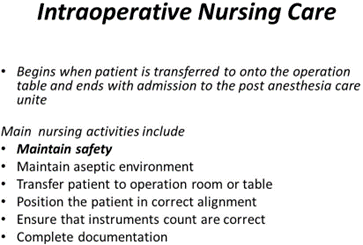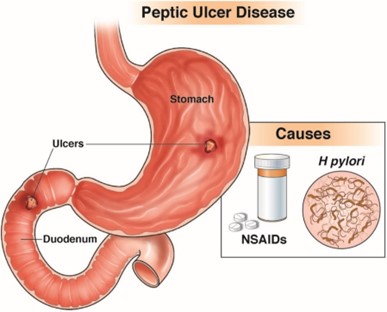One of the intraoperative activities that are performed by the perioperative nurse and are specific to the circulating function is:
admitting, identifying, and assessing the patient.
counting sponges, needles, and surgical instruments.
passing instruments to the surgeon and assistants.
preparing the instrument table and sterile equipment.
The Correct Answer is B
Counting sponges, needles, and surgical instruments is an intraoperative activity that is specific to the circulating function of the perioperative nurse. The nurse is responsible for maintaining an accurate count of all surgical items to prevent leaving any foreign objects inside the patient after the surgery. This is a crucial task to ensure patient safety and prevent any potential complications that may arise from such errors.
Option a. admitting, identifying, and assessing the patient, is a preoperative function that is usually performed by the preoperative nurse.
Option c. passing instruments to the surgeon and assistants, is a scrub nurse function that requires knowledge of the surgical procedure and a sterile technique.
Option d. preparing the instrument table and sterile equipment is also a scrub nurse function that requires expertise in sterile technique, knowledge of surgical procedures, and the ability to maintain a sterile environment.

Nursing Test Bank
Naxlex Comprehensive Predictor Exams
Related Questions
Correct Answer is A
Explanation
Based on the given arterial blood gas results, the patient's pH is elevated, indicating alkalosis. The PaCO2 level is decreased, which suggests respiratory compensation. The bicarbonate (HCO3-) level is within the normal range. Therefore, the interpretation of the arterial blood gas results is respiratory alkalosis.
Correct Answer is B
Explanation
Abdominal discomfort an hour after a meal is a common symptom of a gastric ulcer because the stomach is where food is initially processed, and stomach acid is most concentrated. In contrast, duodenal ulcers typically cause pain 2-3 hours after meals, as food moves out of the stomach and into the duodenum, where it encounters duodenal acid.
A positive stool occult blood test is a non-specific finding that can be caused by many gastrointestinal conditions, including peptic ulcers. It does not indicate the location of the ulcer.
The number of ulcers the client has had in the past does not indicate the location of the current ulcer.
Normal hemoglobin and hematocrit levels do not provide information about the location of the ulcer.


Whether you are a student looking to ace your exams or a practicing nurse seeking to enhance your expertise , our nursing education contents will empower you with the confidence and competence to make a difference in the lives of patients and become a respected leader in the healthcare field.
Visit Naxlex, invest in your future and unlock endless possibilities with our unparalleled nursing education contents today
Report Wrong Answer on the Current Question
Do you disagree with the answer? If yes, what is your expected answer? Explain.
Kindly be descriptive with the issue you are facing.
